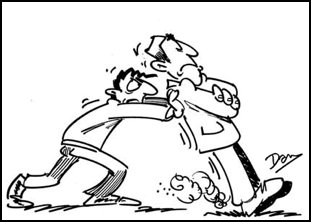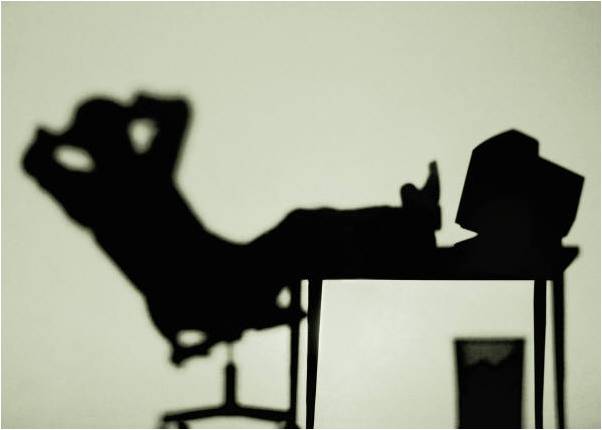Let’s continue our brief reading of amazing book “Mental traps” by Andre Kukla with JiJi!
Resistance

“Resistance – it is a kind of ” well, a little bit more. ” Especially vividly demonstrates this a situation when in the morning a person delay three times the alarm for 5 minutes ahead. Or when while watching an exciting movie doorbell rings, and only after the number doorbell pressing by unknown guest, you get up and go to open.
 Resistance – is the complete opposite of anticipation. Put simply, if anticipation is a kind of desire to run ahead of time, the resistance – to remain longer in the current situation, not to react new conditions. These conditions can suddenly change the situation, which puts more important tasks. A. Kukla jokes: “Why would you continue to look like coffee boils if robber burst into the apartment?”.
Resistance – is the complete opposite of anticipation. Put simply, if anticipation is a kind of desire to run ahead of time, the resistance – to remain longer in the current situation, not to react new conditions. These conditions can suddenly change the situation, which puts more important tasks. A. Kukla jokes: “Why would you continue to look like coffee boils if robber burst into the apartment?”.
Procrastination
 “It often happens that we definitely decide to do something, but it is difficult to start it. Our mind simply refuses to go directly to the cause. ” With this mental error encountered in his life almost everyone – an accountant who looking for small cases,delaying on the last Friday of the month the monthly report writing; student, postponing delivery of the course project on the last day of the allotted period.
“It often happens that we definitely decide to do something, but it is difficult to start it. Our mind simply refuses to go directly to the cause. ” With this mental error encountered in his life almost everyone – an accountant who looking for small cases,delaying on the last Friday of the month the monthly report writing; student, postponing delivery of the course project on the last day of the allotted period.

Procrastination – resistance variation, adjusted for the fact that in resisting we do just do not want to change from one employment to another, but while procrastinating without being busy with something specific, just do not want to work.  In such a case, the person begins to invent excuses for himself why he does not want to do anything. Although the cause is actually one – the work is unpleasant. Work associated with something boring, painful. From a habit you need to get rid of. The main thing – to start doing, then it will be easier.
In such a case, the person begins to invent excuses for himself why he does not want to do anything. Although the cause is actually one – the work is unpleasant. Work associated with something boring, painful. From a habit you need to get rid of. The main thing – to start doing, then it will be easier.
Division

“In the division we find ourselves trapped when trying to do two things at the same time … There is a fundamental law of thought: we can not do two things at the same time, require the participation of our consciousness. In other words, attention is indivisible in principle. “
Examples of division can be any activity where people work simultaneously on two tasks. This error may be due to other mental errors like, for example, anticipation (start of work on a new project before the previous one is completed), and the self, when in order to save time, work on two different tasks. In everyday life we ??are faced with the division of attention in cases where, for example, came to work, run parallel to 1C and check the updates in the social networks.
 A. Kukla quite categorical in regard to the trap of division: “The Universe never requires us to deal with more than one task at the same time. Caught in the midst of thousands of urgent and vitally important things you need to deal with only one – the most urgent … In real life there are situations when it is necessary to do more than one thing at a time. Over-employment is always a trap. “
A. Kukla quite categorical in regard to the trap of division: “The Universe never requires us to deal with more than one task at the same time. Caught in the midst of thousands of urgent and vitally important things you need to deal with only one – the most urgent … In real life there are situations when it is necessary to do more than one thing at a time. Over-employment is always a trap. “
Acceleration

“Acceleration – this is a trap into which we fall when we do something more quickly than than it need. We so quickly mend any home appliance that commit mistake after mistake, and immediately cursed piece of hardware breaks down again. As a result of all the efforts invested by us in this work go down the drain. We could do nothing. “
 Accelerating the opposite procrastination. Wanting to finish the work as quickly as possible, we devote insufficient attention to solving the problem, which may lead to the result, characterized by the phrase “just anyhow.” Went to work and quickly finish him, people feel relieved that quickly mastered quickly reached the target and soon take on new business. But there is a downside. Doing something quickly, we can make mistakes. Besides a sense of haste causes irritation. Think about: a minefield correct run or walk slowly, revealing a safe place to pitch?
Accelerating the opposite procrastination. Wanting to finish the work as quickly as possible, we devote insufficient attention to solving the problem, which may lead to the result, characterized by the phrase “just anyhow.” Went to work and quickly finish him, people feel relieved that quickly mastered quickly reached the target and soon take on new business. But there is a downside. Doing something quickly, we can make mistakes. Besides a sense of haste causes irritation. Think about: a minefield correct run or walk slowly, revealing a safe place to pitch?
To avoid falling into the trap of mental acceleration is necessary to use the Latin maxim: «Festina lente» – «Hasten slowly.”
Regulation
“… The most incomprehensible mistake is that we take itself head so as not to think at all. In similar, like twins, traps regulation and formulation we shape our attitude to things that do not relate to our lives, make decisions that are best left to chance, or aggressively, step by step, describe the events – like a film under the called reality need our comments. “
The mental trap regulation occurs on the basis of inability to determine how to act in different situations, on the basis of an impulse or a prescription. In this trap we get every time we think about the action where you can trust the momentum, and vice versa. Ignoring the pulse leads to the fact that the decision-making process and the act itself takes much more time, because the prescription is required to distinguish between pulses and describe before following them.
Formulation

“Formulation – a continuous trap of pronunciation of thoughts that seem true.”
On the one hand this could be a description and evaluation. A. Kukla says that human’s problem is that, instead of enjoying the beauty of the sunset, we begin to talk about its beauty, describe, compare. This makes it difficult to get the real pleasure of the moment. Although, if people do not resort to such mental operations – has never been used discoveries and a treasury of human knowledge is still empty.
On the other hand the formulation results in the playback head in the different scenarios of events, most of which will never come. Ask yourself honestly, how many times in preparation for the conference or for an interview on the job, you imagine the possible scenarios, the possible questions asked? How much of all this actually happened later?
At the end of A. Kukla gives a universal recommendation: “The majority of mental traps can be avoided by simply focusing on the task at hand. During washing dishes or walking to the store there is no need to think about what will happen next, or what happened before. There is only this dirty spoon, the street in front of us. Any deviation to the side – and we are waiting for the trap. If our thoughts rush into the future, we are able to fixation or anticiption. If we look to the past, then we fall into a trap reversal or resistance. But still there is a way of avoiding this, that does not lead either to the past or into the future.
Improve your brain with JiJi!












